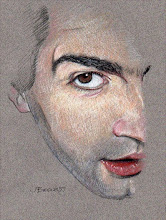Most things here in New Orleans are not very well populated. There aren’t a lot of stores open, and many of the residents of some city sections are not back yet. Yet, there seem to be at least 2 places that are up and running - and very well populated.
In the first category are the churches. They have become recovery centers, food distribution points and temporary homes for out of state volunteers. Right now I am staying in a tent city run by a local group of churches. Good News Camp. There are 600 here. All kinds of people come here each day to be fed, cared for and ministered to.
In the second category are the bars. They are also well populated and may have been some of the first stores to be up and running. (judging by the quantity I’ve seen) They also attract people of all types. They are all over the city.
One could argue that, in some way, both of these places are serving the same purpose: escape from the pain of the present.
The bars offer something to numb that pain. Through alcohol, some people are able to escape from the depression, the loneliness, the hopelessness - by forgetting. Though only for a few hours, (or in some cases an entire evening)
The churches and relief efforts also offer an escape from the current pain. People let their hearts and minds escape to the future - to the possibility of something better than today.
They can move past their harsh present by dwelling on a better future.
Both means allow people to cope, but they are not equal.
Alcohol, though it may provide an escape, produces nothing. After the temporary relief, the user must return to the same reality - nothing has been done to change it. If the bars or the bottle are my method of dealing with unpleasant reality, there is little possibility of that reality changing. I will need to numb myself to that reality again tomorrow.
Faith and Hope, on the other hand, empower the heart to action. If I believe that a better day awaits me tomorrow and the day after that, I can participate in bringing it about now. I need not be debilitated by it. Hope trumps despair. It allows the bearer to continue on, fully acknowledging reality and moving despite it.
We had many opportunities to hear from some of the hardest hit residents of New Orleans. Some were deeply embittered. Some were defiantly hopeful. The contrast was wide.
Ida Mae, and elderly women whose home we gutted, told us about the 4 months she was away from New Orleans. She lived one week at a time in various places, than settled in for 2 months in Texas before she could come to a relative’s apartment in the city.
She was a hopeful one. She was fun to be with. She talked with us about how bright the future of her city could be. She was grateful for all that she still had. (it fit in one suitcase) She seemed to be grateful now for what had not yet come.
Others told us that if you live in New Orleans, you really need to drink in order to deal with it. They were not so hopeful. Nor were they very pleasant. They seemed to focus on what won’t fix itself and who was to blame. They could not see a better future. They had no hope, other than to avoid the problems.
I wish I were more like Ida Mae, but I fear I fall into the numbness category. I’m not living in a disaster zone but I don’t really need to be. I seek to escape and distract and numb myself from the shadowy parts of my life.
What if each of us faced the dark parts of ourselves with the perspective of faith and hope? What if we were unwilling to ignore, numb and distract ourselves from our own badness? Could we simultaneously acknowledge our 'sinfulness' and embrace a solution? (a whole other discussion is whether we need outside help to make it better!) What might the solution look like?
These things are worth thinking about - for all of us. And they are worth doing something about - for all of us.
skip to main |
skip to sidebar
far from succinct, unplanned thoughts on my inconsequential mental minutia
